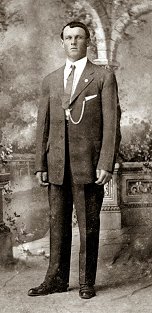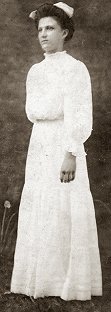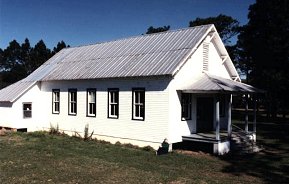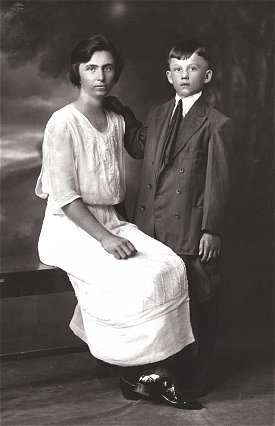The Republican Party nominated Abraham Lincoln to be their candidate for President of the United States in May 1860. In August of that year a boy was born to the Kulicka family in the part of Czechoslovakia called Moravia. They named their son Joseph. Nothing is known about the early childhood of Joseph but at some point in his young life he developed an attraction to a girl who was about five years older than he was. Her name was Victoria Zavadil. She was born in the same area as he was on Christmas Eve in 1855. They were married in their homeland in 1882 when Joseph was 21 and Victoria was 26.
Six years after they married, the couple had their first child, a son, born in Moravia in May of 1888. It was a tradition to name the first son after the father so he was named Joseph Kulicka, Jr. Two years later they had another son whom they named Antone. After the birth of Antone, Joseph and Victoria Kulicka packed up their family of two and what possessions they could carry with them and sailed for America. They arrived in Galveston, Texas and settled where other immigrants from Czechoslovakia had been locating in Lavaca County. Lavaca County is about half way between Houston and San Antonio. One of the towns in Lavaca County was actually named Moravia after their homeland. The town where they settled was called Hallettsville. June 10, 1892 the Kulicka's had their third child and this time it was a daughter who they named Celestina. Six years later in September 1898 they had another daughter who they named Klotilda. These girls were called Tiny and Tilda by their family and friends.
Going back to Czechoslovakia now to bring another family into our story, we visit a Moravian town called Rakvice which is southeast of the capital city of Brno and near the border with Austria. August 11, 1827 a man named Jacob Foukal was born in Rakvice. We do not know who Jacob married but when he was about thirty-one years of age he had a son named Joseph, born Mar 20, 1858. Joseph was married February 4, 1879 to a girl named Anna Krivanek. Anna was born May 17, 1858 in Rakvice and this being a very small town they must have known each other through out their childhood. They were both about 21 years old when they married.
 Joseph and Anna had five sons. One was named Joseph after the father and one was named Jacob after his grandfather. The other three were John, Sylvester, and Frank. Frank is the one we will add to our story at this point. Frank Foukal was born January 7, 1883 in Rakvice, Moravia. Although we know nothing about his childhood growing up with his four brothers, we know that in November 1904 when he was 21 years old he joined the military. Whether it was voluntary or if he was drafted we do not know but he served with the 99 Infantry Regiment until July 1906. He was discharged due to poor eyesight.
Joseph and Anna had five sons. One was named Joseph after the father and one was named Jacob after his grandfather. The other three were John, Sylvester, and Frank. Frank is the one we will add to our story at this point. Frank Foukal was born January 7, 1883 in Rakvice, Moravia. Although we know nothing about his childhood growing up with his four brothers, we know that in November 1904 when he was 21 years old he joined the military. Whether it was voluntary or if he was drafted we do not know but he served with the 99 Infantry Regiment until July 1906. He was discharged due to poor eyesight.

Within a year of his discharge Frank Foukal left Europe. He sailed from Bremen, Germany on the S.S. Hannover April 25, 1907 and arrived in Galveston, TX on May 20th. Where he lived when he first arrived is not known for sure but he must have spent some time around the Hallettsville area. What is known is that he worked in Deweyville, Texas which is right on the border with Louisiana just east of Beaumont. When the United States census was taken April 30, 1910 Frank was working in a lumber yard in Deweyville and one of his co-workers was Joseph Kulicka. Frank must have taken a liking to one of Joseph's daughters because he and 19 year old Celestina Kulicka were married in the Sacred Heart Catholic Church in Hallettsville May 1, 1911.
Something attracted the Foukals and the Kulickas eastward because they all moved to Alabama in 1912. They settled in a place called Silverhill in Baldwin County, Alabama, just across Mobile Bay from Mobile. Silverhill was founded in 1896 when some immigrants from Sweden chose the area to colonize. There was an economic depression going on in American and the Illinois Central Railroad was offering free transportation as far south as Nashville, Tennessee. A group of Swedes took advantage of the railroad's offer and bought tickets from Nashville to Montgomery, Alabama. Once they were in Montgomery they did some research at a real estate office in search of good agricultural lands in Alabama. Their research led them to Mobile and Baldwin County. After looking the area over they decided on the area which is now Silverhill to purchase some land. They returned to the Chicago area to report to other interested parties and to make preparations for colonizing the new land. By June of 1896 all of the legal matters were completed and the land was ready for the new landowners to occupy.
In 1898, the first settlers came to Silverhill and by the turn of the century a steady influx of land seekers and settlers were coming to the colony. Most came during the fall and winters months-prompted no doubt by the weather up north. Those who decided to stay, pitched in with a desire and determination to turn a forest wilderness into cultivated fields and comfortable homes.
The farmers began to plant crops for marketing: sweet and Irish potatoes, string beans and some strawberries. These had to be hauled by horse and wagon to Daphne, and then by boats to Mobile. Often the prices were so low that the farmers received practically nothing for their labors. Hoping to produce a money making crop, cotton was planted in 1904 and a little cash was obtained from this new venture.
By 1906 Silverhill had grown into quite a town with hotels, churches, stores, a school, library, a sawmill and a post office. Transportation from the colony to Mobile had improved. Freight could be hauled from Silverhill Landing, down Fish River to Fairhope, and then across the bay to Mobile. Even more important, the Louisville and Nashville Railroad was being built and new towns like Loxley, Robertsdale, Summerdale and Foley were springing up along its route.
During the period 1909-1914 many Czech settlers came to Silverhill. Among those who came during this five-year period were the Foukals and Kulickas, who came from Texas in 1912. Christmas Eve of 1912 Frank and Celestina Foukal had a son born in Silverhill. He was named Walter Foukal. The war started in Europe June 28, 1914 and just two weeks later on July 10, 1914 another child was born to Frank and Celestina. This time it was a daughter who they named Ludmila. The family always referred to her as Lilly.
 The Czechoslovakians built the first public hall-known as the Little Hall. It was a meeting place for the Czech people. Anton Kulicka donated the land on which they built the Hall. Anton was the brother of Celestina Kulicka Foukal. All the Czechs in Silverhill pitched in and cut timbers which they hauled to the sawmill to have cut for lumber. This building also served as a school for the farm children in that area. This is where Walter would spend his first years in school. Later, as more Czechs began to settle in Silverhill the hall was enlarged.
The Czechoslovakians built the first public hall-known as the Little Hall. It was a meeting place for the Czech people. Anton Kulicka donated the land on which they built the Hall. Anton was the brother of Celestina Kulicka Foukal. All the Czechs in Silverhill pitched in and cut timbers which they hauled to the sawmill to have cut for lumber. This building also served as a school for the farm children in that area. This is where Walter would spend his first years in school. Later, as more Czechs began to settle in Silverhill the hall was enlarged.
In 1915 a British passenger liner named the Lusitania was sunk by a German submarine. There were American citizens aboard the ship that were killed and this hardened anti-German feeling in the United States. To some people Bohemians were considered the same as Germans so Baldwin County, Alabama, with its large number of immigrants from Czechoslovakia, was just the place for hot tempers to start trouble. In 1917 the United States entered the war in Europe and it became World War One.
November 11, 1918 the war came to an end in Europe. The war, that Frank Foukal and others we have learned about left their homelands to avoid, had been fought and was now over. Frank's son, Walter Foukal, had his sixth birthday on Christmas Eve. All of the family must have been happy that Christmas for those they left behind who had to endure the four years of war. Six months later Frank Foukal sold a mule for $55.00 to a man named Robert Bishop who lived in Point Clear. On Sunday, June 1, 1919, the man brought the mule back to the Foukal's farm and wanted his money returned, saying he was dissatisfied with the animal. Frank was not home at the time and Celestina paid Bishop part of what he had paid for the mule with some money she had. When Frank got home, it was evident to him that the mule had been mistreated and overworked. Robert Bishop was not satisfied with the settlement so he returned with his brother to get the rest of his money. The men were armed with a shotgun. The men were unable to come to an agreement over the issue. An altercation followed and shots were exchanged by Frank Foukal and Bishop's brother. The Bishops left the scene and were followed by Frank. Frank fired his rifle at their buggy and Robert Bishop was killed.
Frank went immediately to the Sheriff's office in Bay Minette and surrendered himself. He was placed in the Baldwin County Jail there in Bay Minette to await trial. At a hearing, he was ordered held without bond awaiting a decision from a Grand Jury. Frank feared he would not receive a fair trial and thus never be freed. He also feared for his life even if he was found not guilty of any crime. He told his wife Celestina that if something were to happen to him he would find a way to get word to her. He said to check his body very closely if he were to be killed while being held in the jail. On Sunday, June 22, 1919, in the early morning hours, a mob of men broke into the jail while the sheriff was sleeping. The men secured the jail keys and went into Frank Foukal's cell. They shot him several times and he died within minutes. When Frank's body was released to a funeral home, Celestina, remembering what her husband had told her, asked the funeral director to allow her to search his personal effects. She found two notes hidden in the lining of his coat on which he had written messages. Those messages were written in Czech and kept in the family. They were translated into English and read:
June 6, 1919
Dearest Wife and Children
There will be an attorney, Frank Stone, coming to see you. Tell him whatever he will ask and give him the two hundred dollars. Anton will translate for you. Saturday bring children and Anton should come also. Each one will get time to see me. Maybe they will let me go with you Saturday. God be with you until I see you again.
Your husband
Frank Foukal
June 6, 1919
Dearest Wife and Children
My hearty greeting to you all and forgive me for what I have done and I too forgive you all and letting you know that at Johnson's is a contract to our forty acres. For the cultivator I owe $35.00, return the old one and you will get $10.00 back.
When family will write to you, send them each a picture. God be with you. Frank your loving husband you darling and children take care of yourself and have good life. To Laddie give my watch for remembrance, to Liddia buy a watch and to you my wife I gave my last kiss and please forgive me.
What I have in my heart will go with me into the grave but my heart and mind is clear because I was protecting what was rightfully mine. They hounded me and I couldn't do anything to protect myself so it all ended terribly. I know what my future will be but I couldn't get out of it except to leave Alabama. To leave you all was unbearable. Kissing you all and please don't forget me in my last day will be Saturday, according to what lawyer will do. He will pick you up on Saturday. Give him the $200.00 and don't feel bad about it, he is a good man. God be with you and please don't owe anyone anything and be honest with yourself just like I was. What was rightfully mine I gave my life for. I didn't take anything from them but they took my life but they couldn't take away from me my last kiss to you.
After the killing, the sheriff resigned his office rather than face a trial for sleeping while on duty. Thirteen men were arrested for the crime. Nine of the men were charged with First Degree Murder and four with Second Degree Murder. Justice was not served in the trials of these men. The first man tried was convicted of manslaughter and sentenced to ten years. The second man tried was also convicted of manslaughter and sentenced to fifteen years. Two of the men being tried were members of Robert Bishop's family. They were found to be insane and sent to the state asylum in Tuscaloosa. The rest were given very light sentences after pleading guilty to lesser charges. As an example of light sentences, one was convicted of Second Degree Murder and was given a $1,000 fine, six others a $500 fine and six months in prison. The others were convicted of conspiracy and fined $200 - $100. In the same newspaper where some of these facts were found was an article stating that there was a $500 fine for shooting Dove before September 16th of that year.
 After her husband Frank's death in 1919, Tiny raised her son and daughter on their farm. Son Walter, shown in the picture with his mother, must have learned farming quite young in order to help his mother. When Walter Foukal began school in the first grade he was enrolled under his name as it would have been spelled in the Czech language, "Vladislav". That name means Walter in English, so the teacher told him that from then on he would be called Walter. In 1923 Tiny remarried. Her new husband was Joseph John Mayer. Joseph was born in Moravia, Czechoslovakia September 7, 1883, the same year as Frank. Joseph did not take to farming very well. Joseph and Tiny had a total of four children, a son and three daughters. Tiny's son Walter and daughter Ludmila, who was known as "Lillie", were eleven and nine when she remarried so they were a part of the Mayer family as well and Walter was no doubt the main farm hand. Walter and Lille's grandmother, Anna Krivanek Foukal, died back in Rakvice, Moravia, Czechoslovakia, February 11, 1929, almost ten years after her son's death.
After her husband Frank's death in 1919, Tiny raised her son and daughter on their farm. Son Walter, shown in the picture with his mother, must have learned farming quite young in order to help his mother. When Walter Foukal began school in the first grade he was enrolled under his name as it would have been spelled in the Czech language, "Vladislav". That name means Walter in English, so the teacher told him that from then on he would be called Walter. In 1923 Tiny remarried. Her new husband was Joseph John Mayer. Joseph was born in Moravia, Czechoslovakia September 7, 1883, the same year as Frank. Joseph did not take to farming very well. Joseph and Tiny had a total of four children, a son and three daughters. Tiny's son Walter and daughter Ludmila, who was known as "Lillie", were eleven and nine when she remarried so they were a part of the Mayer family as well and Walter was no doubt the main farm hand. Walter and Lille's grandmother, Anna Krivanek Foukal, died back in Rakvice, Moravia, Czechoslovakia, February 11, 1929, almost ten years after her son's death.
Even though America was on the eve of the Great Depression, things remained prosperous for Silverhill and Baldwin County, Alabama during the period 1920-1930. The 20's brought an ice cream parlor, a news and magazine stand, a new grocery store, a restaurant, and a row of tourist cabins. In 1923 came a shipping platform, a feed store, and an egg and poultry business. A new bank was opened but as this decade came to a close, it would join many banks across the nation that closed their doors during the Depression. One business that dates back to the 20's and remains in Silverhill to this day is Peoples' Supply Company. Silverhill was incorporated as a town August 13, 1926. Electricity came to Silverhill in 1931.
Czechs in the Silverhill-Robertsdale area built another public hall on Highway 104, near Robertsdale. It was known as the PZK Hall and served as a meeting place for many educational and recreational functions in the community. Czechoslovakians have always been noted to have an inborn, intense love for liberty. They displayed the same fine characteristics after they became Americans.
At the time that this is being written only two of all these children are still living. The youngest of all of them, Mildred Mayer Krchak, known by the nickname "Micker", was able to supply some of the information about the early days of her family. The other one is Micker's older sister, Yarmilla Mayer Brumfield.
 In the summer of 1934 twenty-one year old Walter Foukal went to Idaho to work for his cousin, Antone Foukal, with the harvest on his farm. We will learn more about that summer adventure in the next chapter. He had the picture at left made while in Idaho.
In the summer of 1934 twenty-one year old Walter Foukal went to Idaho to work for his cousin, Antone Foukal, with the harvest on his farm. We will learn more about that summer adventure in the next chapter. He had the picture at left made while in Idaho.
Walter's mother divorced Joseph John Mayer in 1938 due to his meanness towards her and the children. Joseph actually went as far as strangling his wife and it took two of the children to stop him. He died in Robertsdale, Alabama September 16, 1958.